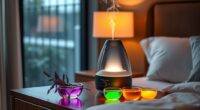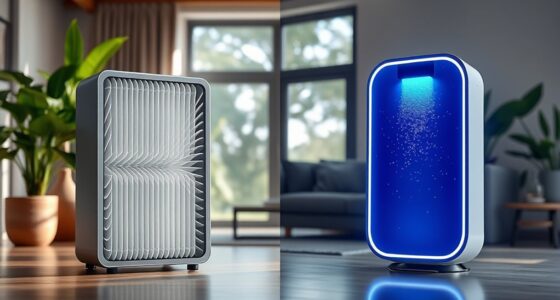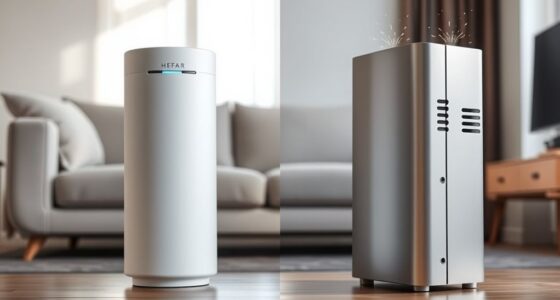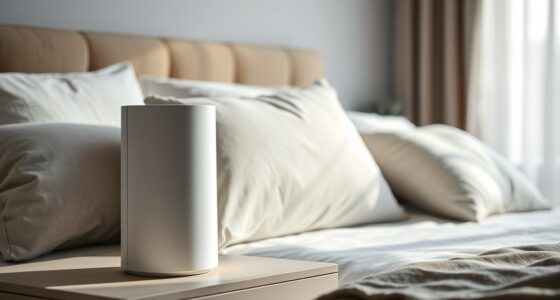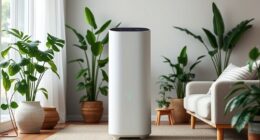Running your air purifier 24/7 offers consistent air quality benefits, keeps allergens and pollutants at bay, and extends your device’s lifespan. However, it may increase noise, shorten filter life, and raise energy costs if not managed properly. Setting your purifier to lower levels or choosing energy-efficient models can help balance performance and expenses. Want to discover tips to maximize benefits while minimizing drawbacks? Keep exploring for helpful insights.
Key Takeaways
- Running an air purifier continuously maintains optimal air quality and prevents pollutant buildup.
- Continuous operation can increase filter wear and maintenance costs due to more frequent replacements.
- Noise levels may become disruptive in quiet spaces like bedrooms or offices.
- Using energy-efficient models and proper settings can help manage electricity costs.
- Regular maintenance and monitoring extend device lifespan and ensure consistent purification.
Advantages of Continuous Operation
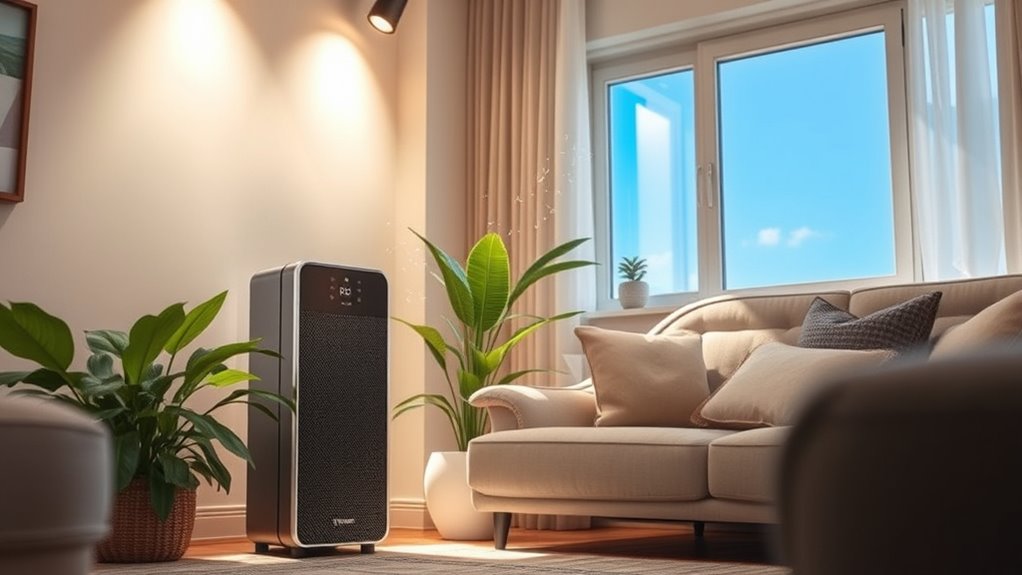
Continuous operation of an air purifier offers several key advantages. By running it constantly, you maintain consistently better air quality, reducing pollutants, allergens, and odors in real-time. This ongoing filtration helps prevent the buildup of harmful particles, creating a healthier environment for you and your family. Additionally, keeping the device active can extend its lifespan, as the motor and filters stay in regular use, preventing issues caused by infrequent operation. When your air purifier runs continuously, it works at ideal efficiency, ensuring cleaner air at all times. This consistency reduces the need for intensive cleanings or repairs later on, making it a smart investment for ongoing air quality management and device longevity. Regular use also maximizes the benefits of advanced filtration technologies, ensuring you get the most out of your air purifier.
Potential Drawbacks and Considerations
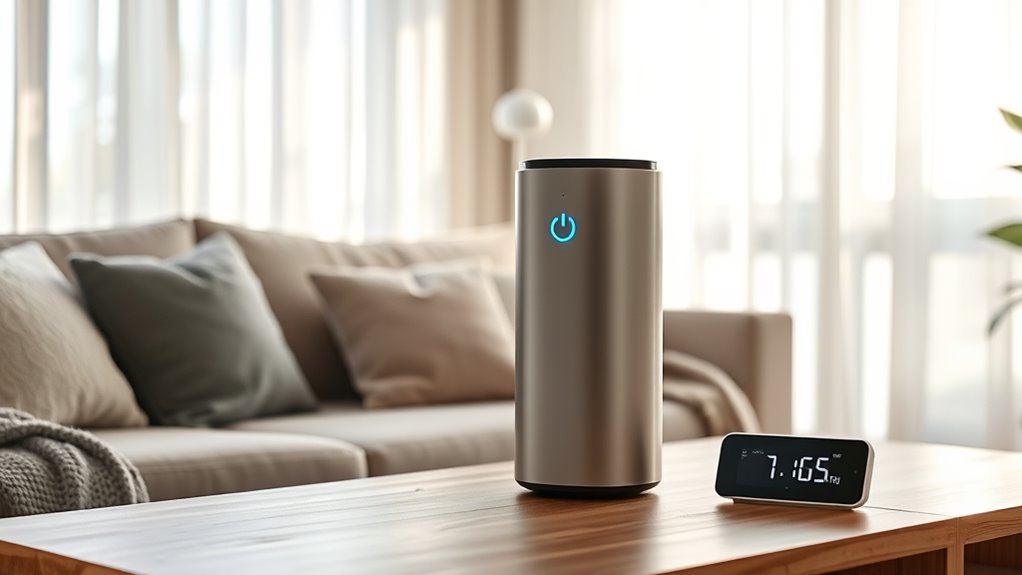
While running an air purifier constantly offers notable benefits, it also comes with potential drawbacks you should consider. High noise levels can become disruptive, especially in quiet environments like bedrooms or offices. Additionally, continuous use can shorten filter lifespan, leading to more frequent replacements and higher maintenance costs. To help you weigh these factors, here’s a quick overview:
| Concern | Impact |
|---|---|
| Noise levels | Can be loud enough to disturb sleep or concentration |
| Filter lifespan | Shortens with constant operation, increasing costs |
Being aware of these issues helps you decide whether 24/7 operation suits your environment and budget. Managing noise and monitoring filter wear are key to maximizing benefits without unnecessary drawbacks. Proper maintenance ensures your air purifier continues to operate efficiently and extends its lifespan.
Managing Energy Consumption and Cost
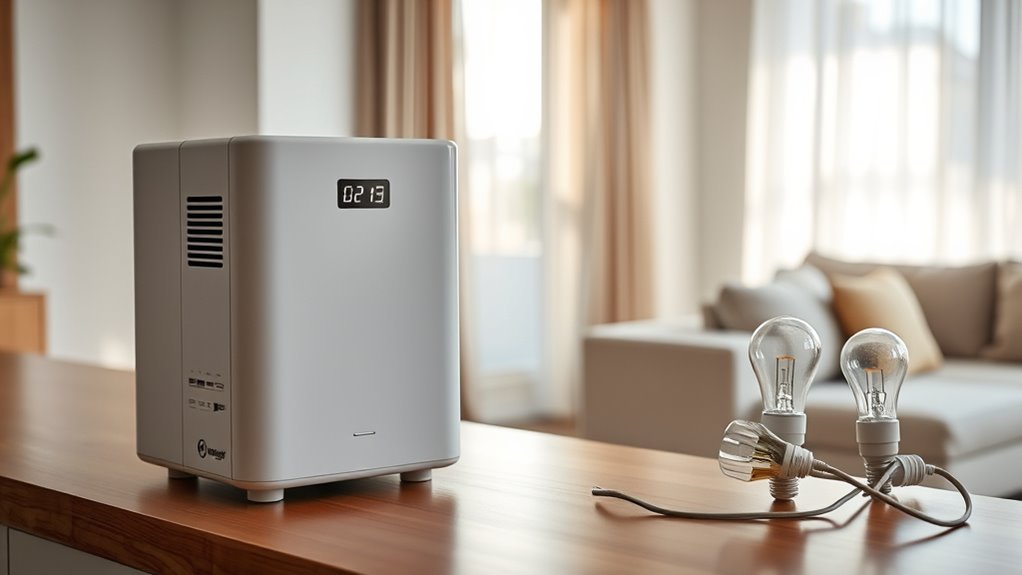
Managing energy consumption and cost is essential to guarantee that running your air purifier remains affordable over time. To do this, monitor the filter lifespan so you replace filters only when necessary, preventing waste and unnecessary expenses. Using an energy-efficient model or setting your purifier to a lower, consistent level can considerably reduce electricity bills. Be mindful of noise levels, as louder settings often consume more power and may tempt you to run the purifier at higher speeds longer than needed. Additionally, scheduling regular maintenance ensures ideal performance without overworking the device. By balancing filter changes, noise levels, and operational settings, you can keep your air purifier running effectively without overspending or wasting energy. Incorporating energy-efficient technology can further optimize your device’s performance and save on costs over the long term.
Frequently Asked Questions
How Often Should I Replace or Clean My Air Purifier Filters?
You should regularly check your air purifier’s filters for dirt and buildup. Typically, a good filter maintenance routine involves replacing filters every 6 to 12 months, depending on usage and air quality. Some filters are washable; in that case, clean them according to the manufacturer’s instructions. Following a consistent replacement schedule guarantees your purifier runs efficiently, maintains air quality, and prolongs the device’s lifespan.
Can Running an Air Purifier 24/7 Improve Allergy Symptoms Significantly?
Think of your air purifier as a knight guarding your fortress; running it 24/7 can give you significant allergy relief by constantly improving air quality. It continuously filters allergens, pollen, and pet dander, reducing triggers that cause symptoms. While it can greatly enhance your comfort, guarantee your filter is clean and your device is energy-efficient to keep costs down. Overall, steady operation helps you breathe easier and enjoy clearer air every day.
Are There Specific Air Purifier Models Designed for Continuous Operation?
Many air purifiers are designed for continuous use, offering high durability and energy efficiency. Look for models with durable filters and energy-saving features like low power consumption and auto-shutoff modes. These guarantee your device runs smoothly over time without excessive energy costs. Choosing a model built for constant operation helps improve air quality consistently while maintaining efficiency and longevity, making it a smart investment for long-term allergy relief and cleaner air.
What Safety Precautions Should I Take When Running an Air Purifier Constantly?
When running your air purifier constantly, you should prioritize electrical safety by guaranteeing it’s plugged into a grounded outlet and avoiding overloading circuits. Handle filters carefully during replacement to prevent damage and avoid inhaling dust or debris. Keep the device on a flat, dry surface, and regularly check for frayed cords or signs of wear. These precautions help ensure safe, continuous operation and maintain your purifier’s effectiveness.
How Does Room Size Affect the Effectiveness of Continuous Air Purifier Use?
Think of your room size as the key to opening your air purifier’s full potential. Larger rooms need higher capacity units, or you’ll be chasing your tail. The room capacity directly impacts filtration efficiency—if the purifier isn’t powerful enough, it won’t clean the air effectively. For continuous use, choose a purifier suited to your space to guarantee maximum efficiency, making every breath you take as fresh as a morning breeze.
Conclusion
Running your air purifier 24/7 can keep your home fresh, much like a steadfast lighthouse guiding ships through fog. While it assures cleaner air, consider the energy costs and potential wear on the device. Balancing continuous use with smart timers can save you coin and power. Think of it as tending a garden—consistent care yields the best results, but overwatering wastes resources. Stay mindful, and your air will stay crisp without draining your treasure chest.

